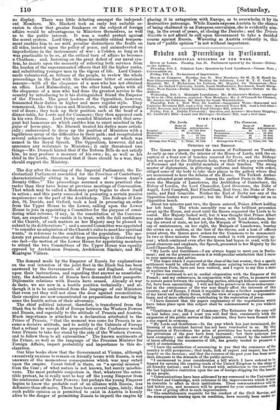The demand made by the Emperor of Russia for explanations
on the real intention of the joint fleet in the Black Sea has been answered by the Governments of France and England. Acting upon their instructions, and regarding that answer as unsatisfac- tory, the Ambassadors of Russia have demanded their passports. Diplomatic relations with Russia have ceased. Already at war de facto, we are now in a hostile position technically ; and al- though it is to be understood from the language of our Ministers that even yet they will not close the door against reconciliation, their energies are now concentrated on preparations for meeting in arms the hostile action of their adversary. The chief political interest, therefore, is transferred from the Black Sea to the wide field of Europe between the Western Powers and Russia, and especially to the attitude of Prussia and Austria, Much importance is attached to a declaration attributed to the Prince of Prussia, "that the moment was come for Prussia to as- sume a decisive attitude, and to notify to the Cabinets of Europe that a refusal to accept the propositions of the Conference would force Prussia to take her stand by the side of the Western Powers, and to follow them to all extremities." The known sentiments of the Prince, as well as the language of the Prussian Minister for Foreign Affairs, impart probability and importance to this de- claration.
Our blue books show that the Government at Vienna, although excessively anxious to remain on friendly terms with Russia, is not unaware of the momentous consequences which war may entail upon the empire. Count Orloff is there, on "a special mission" from the Czar ; of what nature is not known, but surely mischie- vous. The most probable conjecture is, that, whatever the osten- sible pretext, he is really sent to buy off the young Emperor from the conference of the Four Powers : but perhaps the young Emperor begins to know the probable cost of an alliance with Russia, less defensive than offensive. There have been several signs, lately, that such public opinion as is permitted to exist in Austria is keenly alive to the danger of permitting Russia to imperil the empire by
placing it in antagonism with Europe, or to overwhelm it by its destructive patronage. While Russia exposes Austria to the chance of being shattered in an European convulsion, she is evidently aim- ing, in the event of peace, at closing the Danube; and the Trieste Gazette is not afraid to call upon Government to take a decided course against Russia. Wavering as Austria evidently is, this turn of "public opinion" is not without importance.


































 Previous page
Previous page